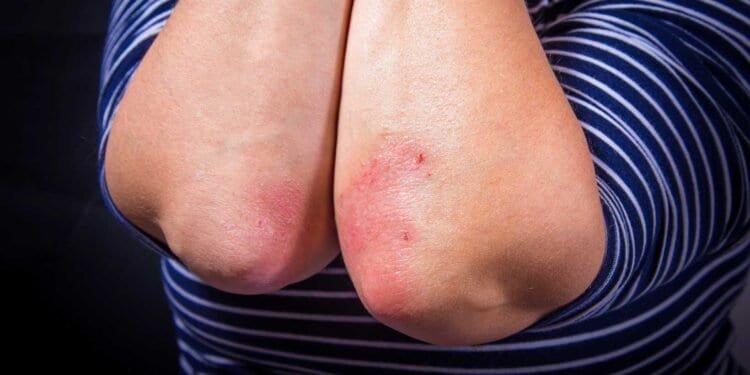Psoriasis is a chronic autoimmune disease that affects the skin, causing red, scaly patches that can be itchy and painful. While the exact cause of psoriasis is unknown, research shows that certain triggers can cause psoriasis flare-ups, including stress, skin injury, smoking, and infections. Another potential trigger that has gained attention in recent years is mold exposure.

Mold is a type of fungus that grows in warm, damp environments, such as bathrooms, basements, and kitchens. Exposure to mold can cause a range of health problems, including respiratory issues, allergies, and skin irritation. Some people with psoriasis have reported that exposure to mold can trigger or worsen their symptoms. While the link between mold and psoriasis is still being studied, it is important for people with psoriasis to be aware of this potential trigger and take steps to prevent mold exposure when possible.
Key Takeaways
- Psoriasis is a chronic autoimmune disease that can be triggered by a variety of factors, including stress, skin injury, smoking, and infections.
- Mold exposure is a potential trigger for psoriasis flare-ups and can cause a range of health problems, including respiratory issues, allergies, and skin irritation.
- People with psoriasis should be aware of the potential link between mold exposure and flare-ups and take steps to prevent mold exposure when possible.
What Is Psoriasis?

Psoriasis is a chronic autoimmune disease that affects the skin. It is caused by an overactive immune system that triggers the skin cells to grow too quickly, resulting in the buildup of thick, scaly patches on the skin.
Types of Psoriasis
There are several types of psoriasis, each with unique characteristics and symptoms:
- Plaque psoriasis: the most common type of psoriasis, characterized by raised, red patches covered with a silvery white buildup of dead skin cells.
- Guttate psoriasis: often triggered by a bacterial infection, this type of psoriasis appears as small, red, scaly spots on the skin.
- Pustular psoriasis: characterized by white, pus-filled blisters surrounded by red skin, this type of psoriasis can be triggered by medications, infections, or exposure to chemicals.
- Inverse psoriasis: affects the skin in the folds of the body, such as the armpits, groin, and under the breasts, and appears as smooth, red patches.
- Erythrodermic psoriasis: a rare but severe form of psoriasis that can cover the entire body with a red, peeling rash.
- Nail psoriasis: affects the nails, causing pitting, discoloration, and abnormal growth.
- Psoriatic arthritis: a type of inflammatory arthritis that affects some people with psoriasis, causing joint pain, stiffness, and swelling.
Symptoms of Psoriasis
The symptoms of psoriasis can vary depending on the type of psoriasis and the severity of the condition. Common symptoms include:
- Red, inflamed patches of skin covered with silvery scales
- Itching or burning sensations
- Dry, cracked skin that may bleed
- Soreness or pain
- Thickened, pitted, or discolored nails
- Stiff, swollen, or painful joints
Psoriasis is a genetic disease, meaning it runs in families. However, not everyone with a family history of psoriasis will develop the condition. Other factors that can trigger psoriasis include stress, infections, injuries to the skin, and certain medications.
Understanding Mold and Its Effects on Health
Mold is a type of fungus that grows in damp and humid environments. It can be found both indoors and outdoors. Mold spores can travel through the air and can be inhaled, which can cause health problems.
Mold Exposure and Infection
Exposure to mold can cause respiratory issues, such as coughing, wheezing, and shortness of breath. In some cases, mold exposure can also lead to fungal infections. Mold can also cause skin irritation and rashes.
Mold can grow on a variety of surfaces, including walls, ceilings, and floors. It can also grow on food, fabrics, and other organic materials. Mold can be difficult to detect, as it often grows in hidden areas, such as behind walls and under floors.
Mold-Related Health Issues
Exposure to mold can also trigger health issues, such as allergies and asthma. In some cases, mold exposure can also worsen existing health conditions, such as psoriasis.
Psoriasis is a chronic skin condition that causes red, scaly patches on the skin. While the exact cause of psoriasis is unknown, it is believed to be related to an overactive immune system. Mold exposure can trigger an immune response, which can worsen psoriasis symptoms.
In addition to psoriasis, mold exposure has been linked to other health conditions, such as chronic fatigue syndrome, fibromyalgia, and Lyme disease.
It is important to take steps to prevent mold growth in the home, such as keeping humidity levels low, fixing leaks, and using ventilation systems. If mold is present, it should be removed as soon as possible to prevent health issues.
The Link Between Mold Exposure and Psoriasis Flare-Ups
Psoriasis is a chronic autoimmune disorder that affects the skin, causing red, scaly patches and discomfort. While the exact cause of psoriasis is unknown, it is believed to be triggered by a combination of genetic and environmental factors. One such environmental factor that has been linked to psoriasis flare-ups is mold exposure.
Immune System Response to Mold
Mold is a type of fungus that grows in warm, moist environments. When mold spores are inhaled or come into contact with the skin, they can trigger an immune system response. This response can lead to inflammation, which can exacerbate psoriasis symptoms in individuals who are already predisposed to the condition.
Inflammation is a key factor in the development of psoriasis symptoms. When the immune system is activated, it releases a variety of inflammatory molecules that can cause skin cells to grow too quickly. This overgrowth of skin cells leads to the characteristic red, scaly patches that are associated with psoriasis.
Mold as a Psoriasis Trigger
Mold exposure has been identified as a potential trigger for psoriasis flare-ups. According to a study published in the Journal of Investigative Dermatology, exposure to mold can increase the risk of psoriasis in individuals who are genetically predisposed to the condition.
Mold exposure can also exacerbate existing psoriasis symptoms. A study published in the Journal of Allergy and Clinical Immunology found that individuals with psoriasis who were exposed to mold had higher levels of inflammation and more severe psoriasis symptoms than those who were not exposed to mold.
To reduce the risk of mold exposure and potential psoriasis flare-ups, individuals with psoriasis should take steps to minimize mold growth in their homes. This can include using a dehumidifier to reduce moisture levels, fixing any leaks or water damage promptly, and regularly cleaning and disinfecting areas that are prone to mold growth.
In conclusion, while the exact link between mold exposure and psoriasis is not yet fully understood, there is evidence to suggest that mold can exacerbate psoriasis symptoms in individuals who are already predisposed to the condition. By taking steps to minimize mold exposure, individuals with psoriasis can help reduce their risk of flare-ups and manage their symptoms more effectively.
Identifying and Managing Psoriasis Triggers

Psoriasis is a chronic autoimmune condition that can be triggered by a variety of factors. Identifying and managing these triggers can help reduce the frequency and severity of psoriasis flare-ups.
Common Psoriasis Triggers
Some of the most common psoriasis triggers include stress, infections, injuries to the skin, and certain medications. Stress can cause the body to release hormones that can trigger inflammation and worsen psoriasis symptoms. Infections, particularly strep throat, can also trigger flare-ups. Skin injuries such as cuts, scrapes, and sunburns can cause psoriasis to flare up in the affected area. Certain medications, such as lithium and beta-blockers, can also trigger psoriasis symptoms.
Lifestyle and Environmental Factors
Lifestyle and environmental factors can also play a role in triggering psoriasis flare-ups. Smoking and alcohol consumption have been linked to a higher risk of psoriasis and can exacerbate symptoms. Diet can also play a role; some people with psoriasis find that certain foods, such as gluten or dairy, trigger their symptoms. Weather and environmental factors, such as cold, dry weather or exposure to mold, can also trigger flare-ups.
Managing psoriasis triggers involves identifying and avoiding the triggers that affect an individual’s symptoms. This may involve making lifestyle changes, such as quitting smoking or avoiding certain foods. It may also involve taking steps to manage stress, such as practicing relaxation techniques or seeking therapy. Protecting the skin from injury and avoiding exposure to environmental triggers, such as mold or extreme weather, can also help prevent flare-ups.
Overall, identifying and managing psoriasis triggers is an important part of managing the condition. By taking steps to avoid triggers and protect the skin, individuals with psoriasis can reduce the frequency and severity of flare-ups and improve their quality of life.
Treatment Options for Psoriasis
Psoriasis is a chronic autoimmune condition that affects the skin. While there is no cure for psoriasis, there are several treatment options available that can help manage the symptoms. The treatment options for psoriasis include topical treatments, systemic medications, and light therapy.
Topical Treatments
Topical treatments are medications that are applied directly to the skin. They are usually the first line of treatment for mild to moderate psoriasis. Topical treatments include corticosteroids, vitamin D analogues, retinoids, and coal tar.
Corticosteroids are anti-inflammatory drugs that reduce redness and swelling. They are available in different strengths and forms, including creams, ointments, and lotions. Vitamin D analogues, such as calcipotriene and calcitriol, are synthetic forms of vitamin D that slow down the growth of skin cells. Retinoids, such as tazarotene, are vitamin A derivatives that help normalize skin cell growth. Coal tar is a byproduct of coal processing that has anti-inflammatory and anti-itch properties.
Systemic Medications
Systemic medications are medications that are taken orally or by injection. They are usually reserved for severe psoriasis that has not responded to topical treatments. Systemic medications include methotrexate, cyclosporine, acitretin, and biologics.
Methotrexate and cyclosporine are immunosuppressant drugs that work by suppressing the immune system. Acitretin is a retinoid that is taken orally. Biologics are a newer class of drugs that target specific parts of the immune system that are involved in psoriasis. Biologics include etanercept, adalimumab, and infliximab.
Light Therapy
Light therapy, also known as phototherapy, is a treatment that uses ultraviolet (UV) light to slow down the growth of skin cells. Light therapy can be done in a doctor’s office or at home with a special light box. There are several types of light therapy, including narrowband UVB, broad-band UVB, and psoralen plus UVA (PUVA) therapy.
In conclusion, there are several treatment options available for psoriasis. The choice of treatment depends on the severity of the condition and the individual’s response to different treatments. It is important to work with a doctor or dermatologist to find the right treatment plan. While treatment cannot cure psoriasis, it can help reduce symptoms and improve quality of life.
Preventing Psoriasis Flare-Ups

Psoriasis flare-ups can be triggered by various factors, including stress, skin injury, and even mold exposure. While it may not be possible to completely prevent psoriasis flare-ups, there are steps that individuals can take to reduce the frequency and severity of these episodes.
Skincare Routines
A good skincare routine can help reduce the risk of psoriasis flare-ups. Individuals with psoriasis should avoid using harsh soaps and hot water, which can dry out the skin and exacerbate symptoms. Instead, they should use mild, fragrance-free cleansers and lukewarm water. Moisturizing frequently can also help soothe dry, itchy skin. It is recommended to use a moisturizer that contains ceramides, which help to restore the skin’s natural barrier.
Stress Management
Stress is a common trigger for psoriasis flare-ups. Therefore, it is important to manage stress levels to help prevent these episodes. Relaxation techniques such as deep breathing, meditation, and yoga can help reduce stress and promote relaxation. Exercise is also a great stress reliever. Regular exercise can help improve sleep quality, boost self-esteem, and reduce anxiety and depression.
It is also important to get enough sleep. Lack of sleep can increase stress levels and trigger psoriasis flare-ups. Healthcare providers recommend that individuals with psoriasis aim for at least 7-8 hours of sleep per night. It may also be helpful to use a humidifier in the bedroom to keep the air moist and prevent skin dryness.
In summary, while it may not be possible to completely prevent psoriasis flare-ups, individuals can take steps to reduce their frequency and severity. A good skincare routine, stress management, and getting enough sleep can all help prevent psoriasis flare-ups. It is important to work with a healthcare provider to develop an effective treatment plan.
Living with Psoriasis
Living with psoriasis can be challenging, especially for those who experience frequent flare-ups. Psoriasis is a chronic condition that requires long-term management. While there is no cure for psoriasis, there are several lifestyle changes that can help manage symptoms and reduce the frequency of flare-ups.
Psychological Impact
Psoriasis can have a significant impact on a person’s self-esteem and mental health. Many people with psoriasis feel embarrassed or ashamed of their condition, which can lead to social isolation and depression. It’s important for individuals with psoriasis to seek support from their loved ones and healthcare providers.
Support and Resources
Support groups can be a valuable resource for individuals with psoriasis. These groups provide a safe and supportive environment for people to share their experiences and learn from others. The American Academy of Dermatology offers a directory of support groups for people with psoriasis.
In addition to support groups, there are several other resources available for individuals with psoriasis. The National Psoriasis Foundation provides education and advocacy for people with psoriasis, as well as resources for managing the condition. Healthcare providers can also provide guidance on managing symptoms and reducing the frequency of flare-ups.
When to See a Doctor
If you have psoriasis, it is important to keep in touch with your healthcare provider, especially if you notice any changes in your symptoms. In some cases, psoriasis can lead to complications that require medical attention. Here are some signs that you may need to see a doctor:
Signs of Severe Psoriasis
If you have severe psoriasis, you may experience symptoms such as:
- Painful, itchy, or burning skin
- Thick, scaly patches that cover large areas of your body
- Joint pain or stiffness
- Difficulty sleeping
- Depression or anxiety
If you experience any of these symptoms, it is important to see a dermatologist or other healthcare provider as soon as possible. Severe psoriasis can be difficult to manage, and it may require more aggressive treatment than mild or moderate psoriasis.
Complications Requiring Medical Attention
In some cases, psoriasis can lead to complications that require medical attention. For example, people with psoriasis are at increased risk of developing psoriatic arthritis, a condition that causes joint pain and stiffness. They are also at increased risk of developing skin cancer, especially if they have had psoriasis for a long time or if they have been exposed to certain medications or treatments.
If you notice any changes in your skin or if you experience any new symptoms, it is important to see a doctor for a diagnosis. Your doctor can help you manage your symptoms and reduce your risk of complications.
Frequently Asked Questions
What are the common symptoms of mold-related health issues?
Mold can cause a variety of health issues, including respiratory problems, skin irritation, and fatigue. Some common symptoms of mold-related health issues include coughing, wheezing, sneezing, runny nose, itchy eyes, skin rashes, headaches, and fatigue. These symptoms may be more severe in individuals who are allergic to mold.
How can mold exposure lead to a psoriasis flare-up?
Mold exposure can lead to a psoriasis flare-up by triggering an immune response in the body. Mold spores can enter the body through the skin, nose, or mouth and cause an inflammatory response. This inflammatory response can trigger a psoriasis flare-up in individuals who are already predisposed to the condition.
What is Chronic Inflammatory Response Syndrome (CIRS) and how is it linked to mold?
Chronic Inflammatory Response Syndrome (CIRS) is a condition that occurs when the body is exposed to biotoxins, such as those produced by mold. CIRS can cause a variety of symptoms, including fatigue, brain fog, joint pain, and skin rashes. CIRS is linked to mold exposure because mold produces biotoxins that can trigger an inflammatory response in the body.
Can living in a mold-infested environment worsen mild psoriasis symptoms?
Living in a mold-infested environment can worsen mild psoriasis symptoms by triggering an immune response in the body. Mold spores can enter the body through the skin, nose, or mouth and cause an inflammatory response. This inflammatory response can trigger a psoriasis flare-up in individuals who are already predisposed to the condition.
What tests are available to diagnose biotoxin illness caused by mold exposure?
There are several tests available to diagnose biotoxin illness caused by mold exposure, including blood tests, urine tests, and visual contrast sensitivity (VCS) testing. These tests can help identify the presence of biotoxins in the body and determine the severity of the exposure. It is important to work with a healthcare provider who is knowledgeable about mold-related illnesses to ensure proper diagnosis and treatment.
What steps can be taken to mitigate the impact of mold on psoriasis?
To mitigate the impact of mold on psoriasis, it is important to reduce exposure to mold. This can be done by identifying and removing sources of mold in the home, improving ventilation, and using air purifiers. Individuals with psoriasis should also work with a healthcare provider to develop a treatment plan that addresses both the underlying condition and any mold-related symptoms.














